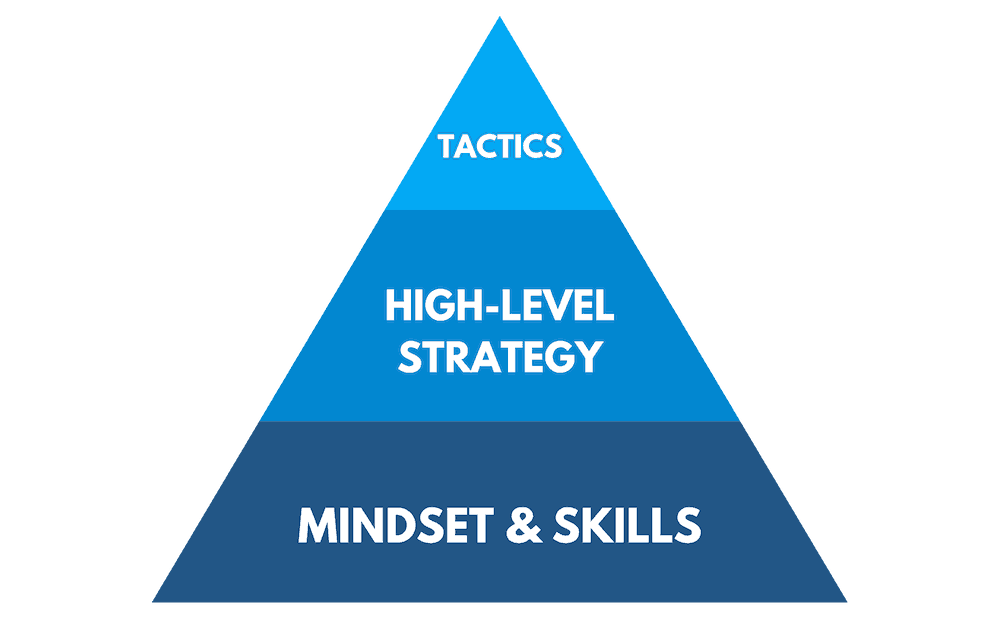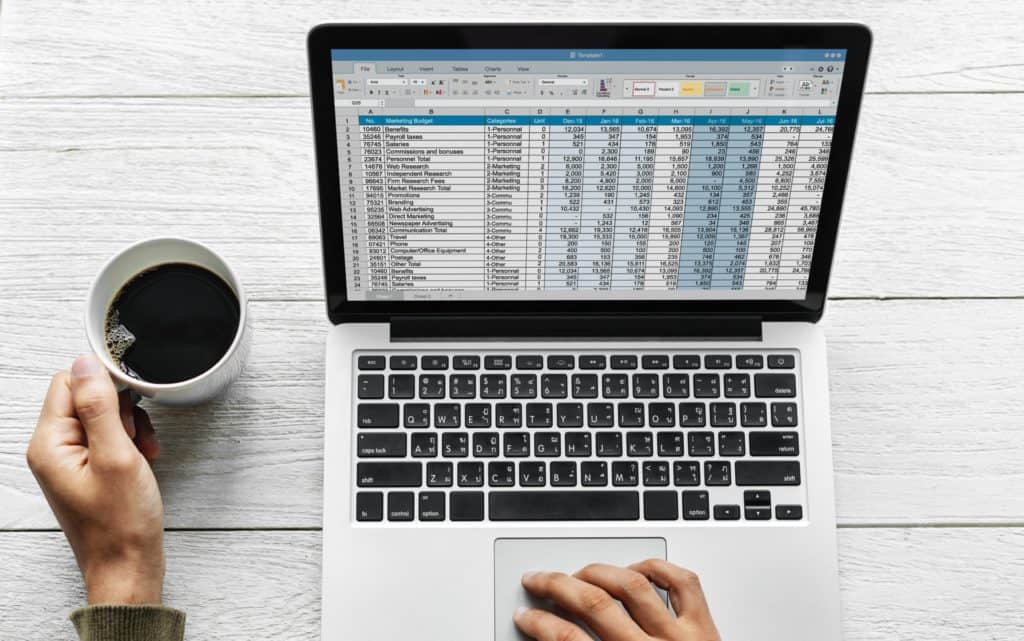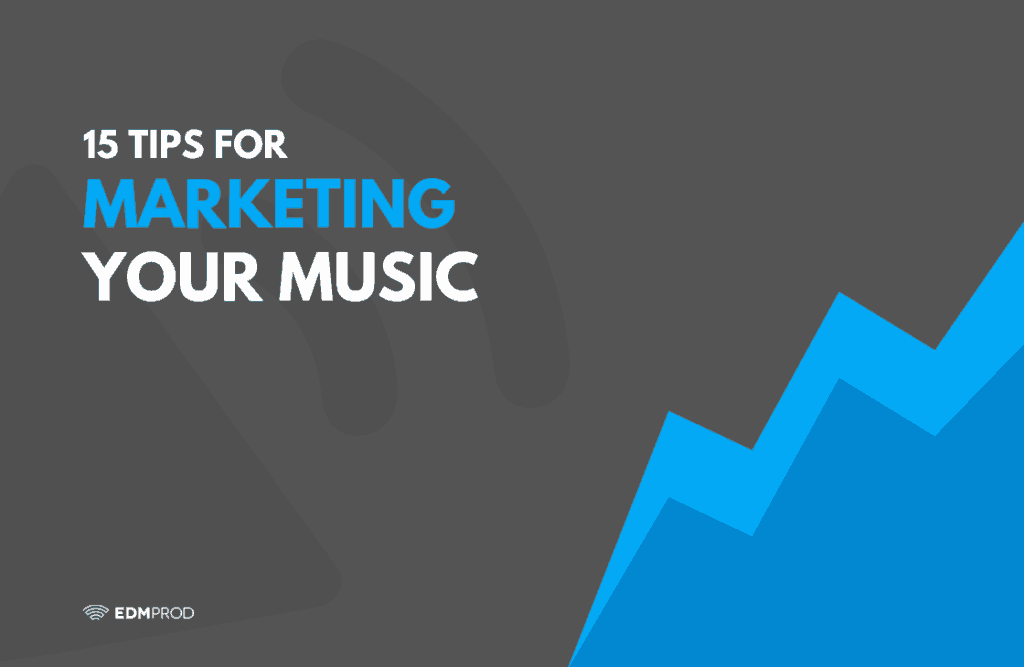When you search online for music marketing and promotion advice, you’ll come across advice that’s too basic…

Advice that won’t work…

Or advice that’s outdated…

The best case scenario is that you get frustrated with these articles and guides, because you know better. You already know enough to realize that this “advice” isn’t going to really move the needle for you.
The worst case scenario is that you follow some of this advice, and end up wasting time and money—then getting frustrated (and perhaps giving up your artist career altogether).
Don’t get me wrong—these articles aren’t bad. There’s some good tips in there. But they’re not cohesive, they aren’t in-depth enough, and they tell you what to do without providing resources for how to do it.
Want 10 extra tips for promoting your music, even if you’re on a budget?
Make sure you don’t miss our free eBook.
What you’ll learn in this article
This article contains 10 tips that will actually help you, if you put in the time and effort. They aren’t going to make you the next Calvin Harris or Rihanna, but if your music is good, these tips will take you to the next level.
The first five tips are on how to think about music marketing, and the skills you need to develop. I want you to have a good foundation to build your brand on, instead of getting distracted by specific, unnecessary tactics like posting EDM flyers in your local retirement home.
The next section of tips is on the high-level strategic aspects of music marketing. The things that don’t change.
Finally, we’ll dive into some more tactical areas. Facebook advertising, Spotify playlists, email marketing, social media, and more. I’ve left this until last because it needs to rest upon everything else (see illustration below)

Mindset and Skills
#1: Marketing won’t fix bad music
My friend Budi Voogt, CEO of Heroic and MD at BitBird, once told me that “good music markets itself after it’s been exposed to X amount of people.”
In other words, marketing builds the momentum, but good music keeps that momentum going.
Marketing is not going to make a bad song good. It’s not going to make a poorly written song a hit. Sure, it might be able to take a below average song from zero plays to 100,000 (or even more)—but it’s not going to change the fact that people want to listen to music that makes them feel good. Bad songs don’t do that. Boring songs don’t do that.
Marketing is not a magic bullet. If your music isn’t yet good, it’s not going have a great effect on growing your streams and fanbase. You need to put in the time and effort to grow your songwriting and production skills first…
If you’re just starting out as an artist or producer, put your head down and focus on your craft. Master the fundamentals. Get good at songwriting. Produce as much music as you can. You’ll know when the time is right.
And if you’re already making good music, don’t neglect your craft as soon as you taste success. You haven’t “made it.” You’re just getting started.
Recommended: Demo Submission: How To (Actually) Submit Demos
#2: Business-minded vs. artist-minded

In my experience, one of the most difficult things for artists and producers to do is shift from the artist mindset to the business mindset (and back again, because you need both).
As an artist, you prefer making music to focusing on the business and marketing side of the picture. It’s hard for you to switch out of “music” mode into “marketing” mode.
And so you fall into one of two traps…
You completely neglect the marketing and business side of your project and just continue to make music, ultimately failing to grow your fanbase. People who do this are usually the ones who end up complaining about how the industry is unfair.
Or…
You completely separate the marketing and business side of your project from your music and artistry. It becomes completely disconnected. As a result, the marketing and business work becomes dry, boring, and uninspiring. You end up hating it.
The solution is to be both artist-minded and business-minded.
You want to make music that you enjoy. You want to spend the majority of your time on your craft. But you also want to grow your career, so you need to be conscious of what’s happening in the industry. You need to think about your brand.
And to do this, you need to take a holistic approach. Branding choices will affect your creative, musical decisions. If a certain song of yours does really well, and it’s in a different style to what you usually make, then it’s smart to shift your style towards what the market wants.
Resources for building your business and marketing mindset:
- The Entrepreneur Mind by Kevin D Johnson
- Relentless by Tim Grover
- How to Fail at Everything and Still Win Big by Scott Adams
- How to Fight a Hydra by Josh Kaufman
Resources for building your artist mindset:
- Turning Pro by Steven Pressfield
- Mastery by Robert Greene
- The Producer’s Guide to Workflow & Creativity
#3: Be hungry and learn
I’ve been in the music industry for 10 years. The artists who I’ve seen do well are those who have the following traits:
- They’re driven. They have a solid work ethic. They don’t make excuses.
- They have a long-term perspective (more on that in the next tip)
- They learn as much as they can
You need to have a solid work ethic if you want to grow a career in this industry. I’ve never met a lazy successful artist. I’m sure there is one, I’ve just never met one—which tells me it’s rare.
If you don’t have a solid work ethic, start developing one. Read some of the books I listed at the end of the last tip. Read about how to set goals and crush them. Don’t sell yourself short and make excuses like everyone else does.
But you also need to be constantly learning, especially when it comes to marketing.
Not only do you need to learn the fundamentals of business and marketing (which most artists don’t do, by the way. They just go straight for the tactics), but you also need to keep up with the rapidly changing landscape. Things change quickly in this industry, and if you’re not on top of it, you’ll fall behind.
Resources for learning business and marketing skills:
- The Best Music Business, Industry, and Marketing Books
- The 22 Immutable Laws of Marketing
- All You Need to Know About the Music Business
- The New Rockstar Philosophy
- The Personal MBA by Josh Kaufman
- Influence by Robert Cialdini
#4: Take the long-term perspective

Building your artist career is a marathon, not a sprint. If you continue to optimize for short-term decisions that have long-term consequences, you’ll find yourself in a place you don’t want to be.
Take actions that will benefit you in the long term. If that means waiting until your songwriting skills are up to scratch before releasing a big album, then wait. If it means not spamming the hell out of your latest release and annoying all your fans, then take a more relaxed approach.
Don’t have a long term perspective? Check out this article where I talk about how to set goals and a long-term vision for your artist project.
#5: Don’t try and do everything
“Long hours spent checking off a to-do list and ending the day with a full trash can and a clean desk are not virtuous and have nothing to do with success. Instead of a to-do list, you need a success list—a list that is purposefully created around extraordinary results.
To-do lists tend to be long; success lists are short. One pulls you in all directions; the other aims you in a specific direction. One is a disorganized directory and the other is an organized directive. If a list isn’t built around success, then that’s not where it takes you. If your to-do list contains everything, then it’s probably taking you everywhere but where you really want to go.” —Gary Keller, The One Thing
It’s tempting to try and do everything and be everywhere.
One blog tells you to do email marketing, a podcaster says you need to be using Instagram stories, an artist tells you that if you’re not doing vlogs on YouTube—you’re falling behind.
But you can’t do everything at once expect to get results. Your resources will be spread thin and you’ll sabotage yourself.
Instead, focus on the key marketing channels, the force multipliers, that will get you results.
And if you really need to do more but don’t have the time, outsource it.
What are they? Let’s take a look…
Being strategic about music marketing
We’ve looked at how to build a strong foundation for marketing your music, along with the necessary mindset and skills that you need to have in order to achieve success.
But what about actually marketing your music? Let’s look at 5 key tips.
#6: Optimize for super fans
Kevin Kelly, futurist and co-founder of Wired Magazine, wrote a wildly popular article titled 1,000 True Fans.
I recommend clicking on that link and reading it before moving on with this article. I’ll still be here when you come back.
(I’m serious)
Kelly’s point is that if you want to build a successful career, and don’t care too much about being the next superstar (which is impossible to guarantee anyway), then you should focus on building true fans.
The premise? If you have 1,000 true fans, you have enough income to support yourself, assuming each fan pays you, on average, $100 per year.
Now, the number might be higher depending on your industry or genre. But the concept remains the same: you want fans who are dedicated. Fans who’ll come to your shows, fans who will buy merch, support you, back your album project on Kickstarter.
How do you get those fans?
- You put out a great product (music, in this case)
- You engage with fans one-on-one
- You consistently overdeliver
#7: Brand is everything

The goal of marketing yourself as an artist is to set yourself apart.
What makes you unique?
What listeners gravitate towards you before or instead of other artists in the same genre?
What do you offer the market that others do not?
The answer? Branding.
Branding includes the style of music you make. The “unique” factor.
It includes your imagery, your visuals, your logo, and your name.
Branding is your personality. How you engage with others.
It’s also the way you perform—your live setup, and your quirks.
Branding is everything.
- Steve Aoki is known as the crazy dude who throws cakes at crowds
- KISS were known for their black and white face makeup
- Michael Jackson was known for his voice, and dancing
What will you be known for?
Resources to learn more about branding:
#8: Market to artists, turn them into listeners
As an artist, your early fans are usually going to be artists too.
This is just the way things are. You make music, and you know people who make music, so you share that music with them.
But you can take this a step further and market to artists and producers outside your immediate circle of friends.
For instance, if you’re an electronic music producer, then you could post YouTube tutorial breakdowns of your songs. These aren’t going to appeal to consumers who don’t make music, but they will appeal to producers, who might end up becoming super fans.
If you’re a singer/songwriter, you might offer free online masterclass sessions once per month to people who sign up for your email list. They’re there to learn from you, but in the process you’re going to reference your own music, turning some of them into fans.
#9: Don’t ignore the data

You’re an artist. You’re creative.
Data? BORING.
But it’s important, and you need to pay attention to it.
Maybe you’re 6 months into promoting your album and you check your Facebook ad insights. 76% of people clicking your ad are females from Brazil, but you thought you were making music for males from Canada.
Well, time for a pivot. You’ve got an audience who like your stuff. Double down on that.
Data fixes assumptions. It helps us make better decisions, especially as artists.
#10) Don’t rely on your manager
This should go without saying, but I’ve seen many artists fall into this trap…
They hustle for years and learn to make great music. Then they market themselves and start to gain traction.
An ambitious manager comes along, picks them up, and they cut a deal.
“Finally!” The artist thinks, “I can go back to just focusing on music again.”
Ah, no buddy. This is where it begins.
If you’re in a position where you have a manager or PR person, or you’re about to be, then realize that while these team members can and will help you with marketing and the business side of everything—YOU are ultimately responsible.
And like I’ve said many times, you want to know enough about the business side of the industry to know who’s a good manager and who isn’t. If you can manage yourself better than they can, then you don’t need them.
Music marketing tactics
#11: Document and create
Gary Vaynerchuk once said, when it comes to social media, “Document, Don’t Create.”
He’s not wrong. Documenting your life, what you’re doing in the studio, and basically just telling your story is far more engaging than posting a regurgitated quote picture on your Facebook page.
But why not do both?
Document the cool stuff that you’re doing: working on a new track, sharing some advice with other artists, playing a show…
And then create some content specifically for social media that captures people’s attention, like Mash’d ‘n’ Kutcher did with their viral video campaigns.
#12: Performer? Leverage visual platforms
Part of the reason Madeon blew up was because of his viral launchpad videos.
JNTHN STEIN is known for how adept he is at using the Ableton Push.
Both these artists have benefitted greatly from the use of visual platforms like YouTube, Instagram, and Facebook video.
If you’re doing something different than just putting USB sticks into CDJs, then show people. Practice your songwriting and production, yes, but also hone your performance skills.
#13: Use email marketing (yes, it still works)

Most artists and producers stay away from email marketing because they think it’s an archaic tool.
After all, everyone is on social media, right? Who’s going to check an email from an artist?
Yes, open rates have gone down over the past two decades, but they still average 21.8% for music and musicians.
And unlike any social media platform, an email list is something that you actually own. It’s yours. People who’ve opted in to receive information from you.
Running an effective email marketing campaign as an artist is another topic altogether. One that I’ll write about at some point.
#14: Crush Spotify with playlists
A couple years back I interviewed Austin Kramer, head of electronic music programming at Spotify.
His mission at Spotify is to make sure good music gets heard, regardless of the size of the artist. Regardless of the number of Facebook fans they have. Regardless of how many shows they’ve played.
How? By putting good music on the right playlists.
Spotify has made this simple with their new Spotify for Artists program. You can manage your profile, and submit your songs to playlists for review.
Don’t just aim for the big playlists either. There are plenty of niche Spotify playlists that have thousands of committed fans. You might not gain a million new followers from ’em, but you’ll make progress.
#15: Paid ads (how to not waste money)
Paid advertising has traditionally been looked down upon among artists, usually because of one or more of the following reasons:
- They’ve tried running ads in the past and lost money.
- They don’t know how to run a good ad campaign.
- They think it’s sleazy.
Paid ads is a great way to waste a ton of money and time if you don’t know what you’re doing. But if you do know what you’re doing, it’s hard to find a better payoff.
Again, to teach you paid ads would require me to publish several articles, so here’s a good resource:
Conclusion + Next Steps
There you have it. 15 solid tips for marketing and promoting your music.
If you’ve reached the end of this article and you’re still stuck, then take some time to read through the resources I’ve linked, including our FREE eBook on promoting your music on a budget.
This article barely touches the surface and doesn’t directly teach you any skills.
And what if you’re a producer who’s not yet ready to market your music?
What if you need to put in the time to level up your production and songwriting skills?
Here’s what I recommend…
If you’re new to music production:
- Read our free guide on How to Make Electronic Music
- Read our article on the 5 Stages of an Electronic Music Producer
- Check out EDM Foundations to Master the fundamentals of production within 4 weeks
If you’ve been making music for a while, but need to level up:
- Check out our series of Track Breakdowns
- Watch my video on how to set goals as a producer
- Master the framework behind unique and memorable music with Songwriting For Producers

